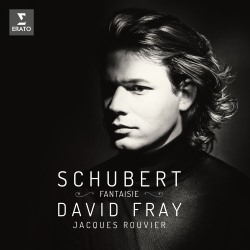
|
Franz SCHUBERT (1797-1828)
Piano Sonata No. 18 in G major, D. 894 ‘Fantasie’ (1826) [39.23]
Hungarian Melody in B minor, D. 817 (1824) [3.17]
Fantasia in F minor for Piano Four Hands, D. 940 (1828) [18.52]
Allegro in A minor, ‘Lebensstürme’, for Piano Four Hands, D. 947 (1828) [16.38]
David Fray (piano)
Jacques Rouvier (piano) (D. 940, D. 947)
rec. 3-6 November 2014, Église Notre Dame du Liban, Paris, France
ERATO 2564 616699 [78.59]
Voted ‘BBC Music Magazine Newcomer of the Year 2008’ and ‘Echo Klassik Instrumentalist of the Year 2009’, Frenchman David Fray has been making considerable strides on the classical music scene. He has made a number of J.S. Bach recordings and his first Erato recording comprised Bach works together with two pieces from Pierre Boulez, his 12 Notations and Incises. However, in 2009 Fray recorded for Erato his first solo Schubert disc. It included the 6 Moments musicaux, D780, the 4 Impromptus, D899 and the Allegretto in C minor, D915.
For this new Erato release Fray has returned to Schubert’s music focused around the imposing Sonata No. 18 in G, D. 894 ‘Fantasie’ together with the short Hungarian Melody, D. 817. Schubert wrote some 60 or so works for piano duet and the final two works, the Fantasia in F minor, D. 940 and the Allegro in A minor, ‘Lebensstürme’ D. 947 are both scored for piano four hands. Here Fray is joined by Jacques Rouvier, his professor at the Conservatoire de Paris who has released a number of albums, of mainly French music, in his own right.
Opening the release is the mighty four movement Piano Sonata No. 18 in G major, D. 894 ‘Fantasie’ composed in 1826 and originally published as the Fantasia in G. This was a highly productive year for Schubert that included his substantial final String Quartet No. 15 in G, D. 887, possibly his greatest in the genre and also completion of his Symphony No. 9 in C, D. 944 ‘Great’. Fray surmounts the many challenges of the G major Sonata ‘Fantasie’ underpinning firmly with a delicious, dark-hued intimacy. Impressively Fray captures the bewildering sadness of the nineteen minute long opening Molto moderato e cantabile which is notable for its persistent restatement of the main theme. There’s a dreamy quality to Fray’s performance of the Andante and the Menuetto is bold and assured with plenty of rhythmic energy together with an innate elegance. In the Finale: Rondo Fray’s playing evokes a folk-dance blended with Viennese Café atmosphere and certainly excels in the engaging wit of the Coda.
Providing a degree of contrast after such a fervent Sonata is the Hungarian Melody in B minor, D. 817. Composed in 1824 it’s the earliest work on the release and short at just over three minutes. Around this time Schubert had been demoralised by the rejection of his Piano Sonata, D. 784 by publisher Diabelli. Nevertheless it was a typically industrious year which included the completion of his Octet, the 'Rosamunde' and 'Death and the Maiden' Quartets. With the tasty morsel that is the Hungarian Melody Fray never undervalues the work and his playing that is alert and sensitive.
In 1828, the final year of his life, Schubert was experiencing severe illness yet completed his last three piano sonatas. The final two works here were also written the same year: the substantial four-hand piano works, the Fantasia in F minor, D. 940 and the Allegro in A minor, 6 'Lebensstürme' (Storms of Life), D. 947. In the Fantasia, a favourite work of mine, the playing of Fray and Rouvier underlines the glorious and memorable wistful melody over a gentle rocking motion. I admire the markedly contrasting central section with energetic playing of an often fiery quality. Described in the notes as a “kind of overture or symphonic poem for piano four hands” the 'Lebensstürme' is interpreted by Fray and Rouvier with a remarkable sense of spontaneity.
Recorded in the excellent acoustic of Église Notre Dame du Liban, Paris the sound is vividly clear, being clear, cool and crisp. This is a mightily impressive release with Fray and his partner Rouvier creating a wide range of colour in what are passionately felt interpretations. The interplay between the players is a constant pleasure. In the case of Schubert's solo piano works my taste is generally for recordings by Radu Lupu and also Mitsuko Uchida; nevertheless Fray’s playing here is not out of place in such esteemed company. In the main work the Piano Sonata No. 18, D. 894 ‘Fantasie’ Fray’s variety of touch and dynamic control combined with a remarkable insight provides breathtaking results.
Michael Cookson
 |
 |
|











